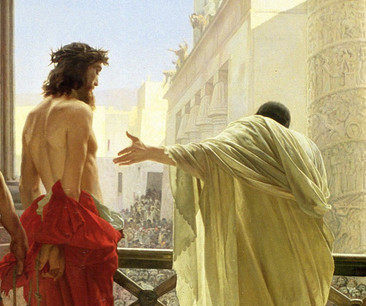The story of the Passion is one which continues today and every day in our lives and the lives of the people all over the planet. It is told in the lives of the poor, in the lives of refugees and immigrants, in the lives of people in prison, in the lives of people on death row, in the lives of single parents, in the lives of the elderly, in the lives of soldiers and combatants and noncombatants, in those who are victims of racism, in those who are powerless and even in the life of the planet earth which has been so abused.
 Each year the Church invites us to bring all of this to the Risen Christ. We relive the final days of the Savior in order to reinforce our conviction that resurrection always follows death and that victory always crowns our failures.
Each year the Church invites us to bring all of this to the Risen Christ. We relive the final days of the Savior in order to reinforce our conviction that resurrection always follows death and that victory always crowns our failures.But understanding this can be difficult, especially during the horror of suffering, violence and death. It would be impossible if we fail to believe that without the cross there can be no resurrection.
In the First Reading for Passion Sunday, the prophet Isaiah refers to both “speaking” and “listening.” The true disciple is both a person who can speak boldly with “a well-trained tongue” and a person whose ear and heart are opened for listening. If we are to be a part of healing the brokenness of our world, we need the grace both to listen and to speak.
Listening to the Passion account reminds us how quickly the Hosannas proclaimed by the people of Jerusalem become the "Crucify Him" of the temple leaders. We’ve heard it all before and we’re inclined to think, “Been there, done that.” But have we?
What do these days say about the atrocities of horror being rained upon Ukraine? What do these days say about multiple meaningless shootings in so many parts of our country? What do these days say about the atmosphere of mistrust, falsehood bigotry that surrounds us daily? Does "Crucify Him" now take on new dimensions for us? It should.
It is important for us to look at Holy Week as a single event. One alone is not enough. Holy Week defines who we are. We are the people of the Table, the people of the Cross, the people of the Empty Tomb.
Holy Week is a single story of the struggle for communion and solidarity in the midst of great challenges and even injustice and suffering. This struggle continues today, and it is not an easy one. As we enter Holy Week let us be more sensitive to the ways that we exclude certain people from the embrace of our affection. Let's try to resist the deep-rooted suspicions that we nurture against persons who, in some way, are "different" from us. Our reflection on the Passion should make it possible for people with very different spiritual needs to find true meaning in the Cross.
We all need the experience of Passion Sunday, Holy Week, The Triduum and Easter to renew our faith and our hope and to reassure us that the love and power of our Father will not allow evil, sin and death to destroy us.




